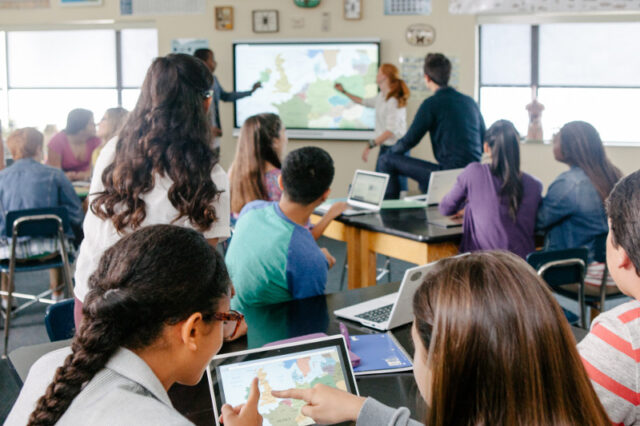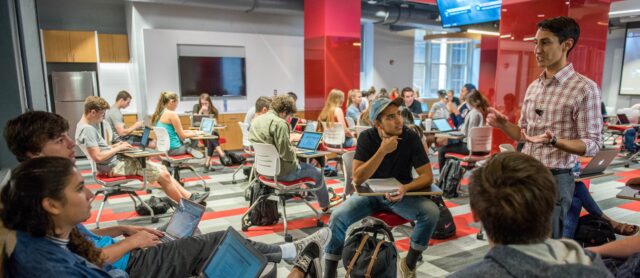
Teaching is a noble profession that profoundly impacts students’ lives. As a teacher, you hold a position to shape young minds and inspire the next generation of leaders.
However, teaching can also be challenging and demanding, requiring constant learning, hard work, and dedication. You must be committed to your profession and continuously strive to improve your skills and knowledge to excel.
The National Education Association reports that the average teacher in the United States spends more than 50 hours per week on work-related activities. With such a heavy workload, feeling overwhelmed and burned out can be easy.
However, by implementing the tips outlined below, you can stay motivated and inspired and excel as a teacher. So, let’s get started.
1. Continue Learning

As a teacher, it is critical to understand that learning is not a one-time event but a lifelong process. The education industry constantly evolves, and keeping up with the latest research, trends, and practices is essential to stay relevant.
By continuously learning and updating their knowledge base, teachers can promote personal growth and enhance their ability to engage with students more effectively.
To achieve this, engaging in ongoing professional development is crucial. Attending workshops, conferences, and seminars and pursuing advanced degrees are all effective ways for teachers to stay current and improve their teaching skills.
Hence, pursuing an online Masters in Curriculum and Instruction program is an excellent choice for educators looking to upskill and advance their careers. This program comprehensively focuses on instructional design, curriculum development, and leadership strategies, empowering educators to become successful PreK-12 curriculum leaders.
Additionally, the program’s online format makes it convenient for aspiring professionals to pursue education without sacrificing their career or personal obligations.
2. Build Strong Relationships with Students
Building strong relationships with students is essential for creating a positive and supportive learning environment. Teachers who take the time to get to know their students and understand their unique needs and interests can better engage them in the learning process.
By building a rapport with students, teachers can establish trust and mutual respect that can improve classroom behavior, increase student participation, and ultimately improve academic outcomes.
Teachers can connect with each student individually by having one-on-one conversations, giving personalized feedback on assignments, or providing opportunities for students to share their thoughts and experiences with the class.
3. Incorporate Technology

Incorporating technology into the classroom can significantly enhance the teaching and learning experience. It can help teachers deliver engaging and dynamic lessons that capture students’ attention and promote active participation.
Additionally, technology can provide access to a vast range of digital resources, supporting students’ learning and helping them develop valuable technical skills crucial in today’s digital age.
4. Practice Effective Communication
Effective communication is vital for teachers in building strong relationships with students, parents, and colleagues. Effective communication involves actively listening to others and clearly articulating one’s ideas and expectations, making it a two-way process.
When teachers communicate effectively with their students, they can establish trust, reduce misunderstandings, and create a positive learning environment that promotes academic success.
Effective communication also involves informing parents about their child’s progress, behavior, and academic performance. By sharing ideas and best practices with colleagues, teachers can improve their teaching strategies and create a positive learning environment across the school or district.
5. Encourage Collaboration

Collaboration can help students build social and emotional skills and foster a sense of community within the classroom. Additionally, it has the potential to create an inclusive and positive learning environment where every student feels respected and valued.
Collaboration can also help students develop valuable teamwork skills that are essential in today’s society. In the real world, success often depends on one’s ability to work with others and build effective working relationships.
In addition to teamwork skills, collaboration can enhance the learning experience by allowing students to learn from each other’s perspectives and insights. Collaborative learning can promote critical thinking, problem-solving, and creativity, allowing students to practice effective communication and leadership skills.
6. Be Fun and Energetic
Being fun and energetic as a teacher can significantly impact student engagement, motivation, and overall learning outcomes.
Enthusiasm and energy are contagious and can inspire students to engage in learning actively. Students learn more when excited about the subject matter and enjoy learning. Thus, teachers must create a positive learning environment that makes students feel comfortable and enthusiastic.
Strategies for being fun and energetic in the classroom include humor, storytelling, and interactive teaching methods. Teachers can incorporate games, puzzles, and other interactive activities that make learning more enjoyable and engaging.
7. Be a Role Model
Teachers play a critical role in their student’s development and are looked up to as authority figures. Thus, it is crucial to set a positive example for students and be a role model for them.
Being a role model involves positively influencing students in and out of the classroom. Teachers should lead by example, demonstrate good character traits, and promote positive behavior among students. This can involve modeling empathy, kindness, respect, responsibility, and integrity.
8. Be Fair, Consistent, and Decisive

As a teacher, it is crucial to be fair, consistent, and decisive to maintain a positive learning environment for your students.
1. Being fair means treating all students equally, regardless of their background or abilities. It involves using objective measures to evaluate student performance and avoiding favoritism.
2. Being consistent means applying rules and consequences uniformly, so students understand what is expected from them. It also involves setting clear boundaries and adhering to them to create a sense of order and predictability.
3. Being decisive means making timely and informed decisions when necessary to address issues that may arise in the classroom. It involves weighing different options and choosing the course of action that is most appropriate for the situation.
Conclusion
The teacher’s role is not restricted to imparting knowledge but also involves inspiring and motivating students to learn and develop. A successful teacher possesses a combination of skills, qualities, and attributes that go beyond academic qualifications.
Building strong relationships with students, providing feedback, and adapting to changing learning needs are just a few skills a successful teacher must possess.
Remember, teaching is a lifelong learning journey, and every day presents growth and improvement opportunities. By continuously learning and adapting to new teaching strategies, teachers can stay up-to-date with the latest educational practices and better meet the needs of their students.












